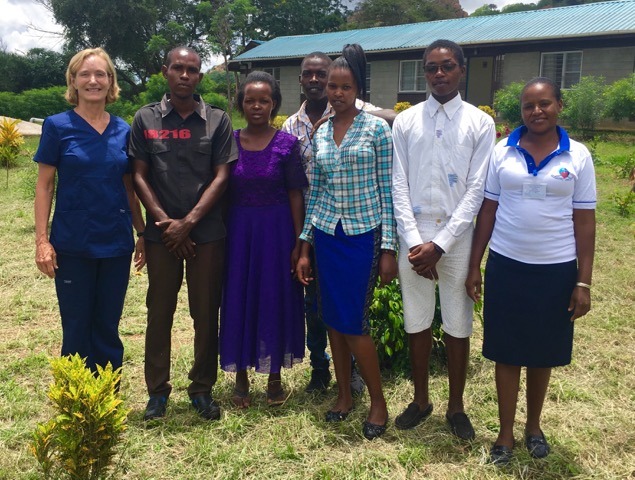Pioneer Nursing Students: Class of 2021

Mindy Weschler is a nurse and nurse educator and one of our international volunteers. She is serving at Mutomo Mission Hospital.
I am struck by the contrast of the experience of departing and/or arriving at college here in Kenya compared to the US. My own memories (oooh too many years ago) of my college drop-off remain vividly etched in my mind today along with the departure and drop-off of my own girls at their respective colleges.
The turning point in a young adult life signals independence and breaking out into the world, an often exciting yet daunting time. For many of the youth here in Kenya, they are the first in their family to attend not only high school but a higher degree in either university or college setting.
After three years of planning, Our Lady of Lourdes Nursing School was established in 2017 here at Mutomo Mission Hospital and the first 17 students arrived in October, three men and 14 women. They have a solid six months of training under their belts having now entered their first clinical rotations. I am so excited that my arrival coincides perfectly with the arrival of the incoming cohort, two men and three women! What a joy to be able to focus on five students!
Attracting students in Kenya this year has been challenging economically and academically. A severe drought hit Kenya in 2017 wiping out most homestead crops, creating severe famine and economic disaster for most rural families. Additionally, for some still unexplained reason, many students did not pass the required Biology exam required for admission to both university and diploma schools. Hence, our intake is only five this semester.
The students travel over barely passible roads, often for days, to arrive here in rural Mutomo. They come with a simple suitcase of their belongings and their own foam mattress and bedding. It is a far cry from the trailer and SUV loaded vehicles arriving at campuses across the US. Not to mention the multiple trips to Walmart, IKEA, and Target for anything forgotten.
Here, the women and men stay in separate “hostels”, each room housing eight students in a row of four bunk beds. There are no private rooms. No television, water, sink, WiFi, desk, or bureau. Each student has his or her own locker, about 3×3 feet for their belongings. They are expected to make their beds daily and when not in clinical rotation, their chores include sweeping and mopping of the hostel. Showers and toilets are ample and clean, though there is no hot water.
Students take their meals at specified times in the hospital managed café. It’s open from 6 am to 10 pm and also serves the staff and members of the community. A typical dinner consists of a veggie omelette and chapatti. It costs about $1.20 and is included in the cost of tuition.
Anthony is an incoming student. At 28, he has spent the last 10 years – since high school graduation – working to support his family. He is the third born of six and the first male in his family. This role comes with a lot of responsibility, especially since his father died in 2015. Anthony, like most first born boys here in Kenya, was required to shoulder the economic and emotional support of the family after his father died.
He has received financial support from his younger brother, now a teacher, and his mother to cover the annual tuition, 147,000 Kshillings or about $1,470 US. He traveled by bus from his rural village along with his mother. The journey was painstakingly slow over the dusty and washed out roads. It took over seven hours, crammed into a “matatu” loaded with 10 other travelers.
Only three of the five students have arrived so far, so Anthony spends all morning sitting aside the water tank awaiting word on when the other students will be joining him. He shyly but eagerly answered my many questions. He is clearly proud to be enrolled in the school, as is his mother.
When classes open on Friday, we will have a better idea of the incoming cohort and more stories will follow!